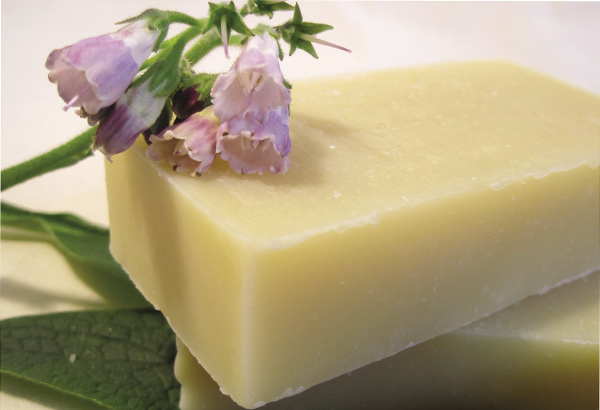 When Tandi Book started making soap as a hobby about eight years ago, she was using common vegetable ingredients, like coconut and olive oils. But after meeting her husband, who worked on an organic farm that raised beef, she began experimenting with tallow, or beef oil. Animal fat in soap may seem unusual, but actually even the biggest soap brands, including Dial and Dove, use tallow, too, although not from sustainable farms. “As I got more into the local food thing,” says Book, “it just started to make more sense… You have a responsibility as an eater to try to use as much of the animal as [you] can.” Initially, she rendered the tallow herself, but the three-day process was too labor-intensive. Now, Book uses tallow from a Lancaster County custom butcher who processes animals for small-scale farms. Only 30 to 40 percent of the oils in the tallow soap are from beef; the rest are coconut and olive oils. This combination creates a conditioning and moisturizing bar that’s harder and lasts longer, explains Book, who also makes vegan and vegetarian soaps with vegetable oils and herbs from her garden. Her bath products and lip balm don’t use tallow, but her laundry soap is 100 percent tallow-based, and her new solid dishwashing soap uses a small amount as well.
When Tandi Book started making soap as a hobby about eight years ago, she was using common vegetable ingredients, like coconut and olive oils. But after meeting her husband, who worked on an organic farm that raised beef, she began experimenting with tallow, or beef oil. Animal fat in soap may seem unusual, but actually even the biggest soap brands, including Dial and Dove, use tallow, too, although not from sustainable farms. “As I got more into the local food thing,” says Book, “it just started to make more sense… You have a responsibility as an eater to try to use as much of the animal as [you] can.” Initially, she rendered the tallow herself, but the three-day process was too labor-intensive. Now, Book uses tallow from a Lancaster County custom butcher who processes animals for small-scale farms. Only 30 to 40 percent of the oils in the tallow soap are from beef; the rest are coconut and olive oils. This combination creates a conditioning and moisturizing bar that’s harder and lasts longer, explains Book, who also makes vegan and vegetarian soaps with vegetable oils and herbs from her garden. Her bath products and lip balm don’t use tallow, but her laundry soap is 100 percent tallow-based, and her new solid dishwashing soap uses a small amount as well.
Tandi’s Naturals are sold in Philadelphia’s Rittenhouse Farmers Market on Saturdays, Headhouse Farmers Market on Sundays, and online at tandisnaturals.com

